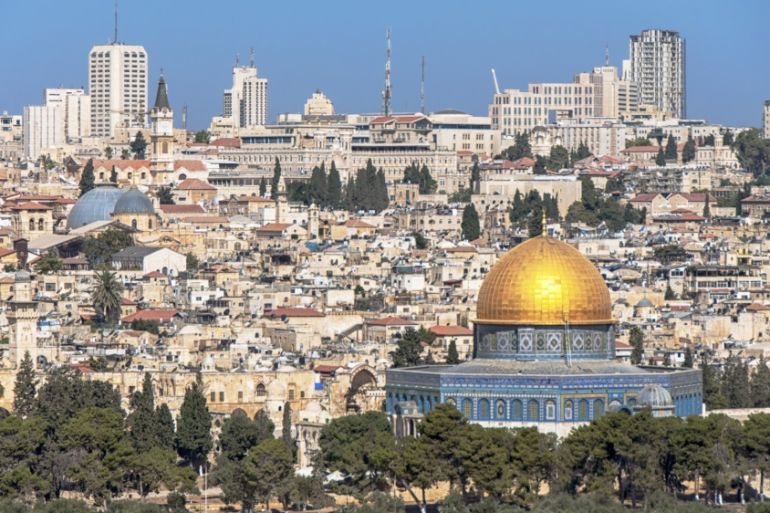Egypt hosts ‘told to convince viewers’ over Jerusalem
New York Times says tapes it obtained reveal how intel official told hosts to persuade Egyptians to accept Trump’s move.

A report by the New York Times has said that while Egypt’s government was publicly condemning a US decision to recognise Jerusalem as Israel’s capital, a state intelligence officer was asking influential TV hosts in the country to persuade their viewers to accept it.
The newspaper reported on Saturday that it had obtained audio recordings in which Ashraf al-Kholi, the intelligence officer, can be heard telling the hosts that Egypt, like its “Arab brothers, are denouncing this matter”, but that “after that, this thing will become a reality”.
“Palestinians can’t resist and we don’t want to go to war,” added Kholi, according to the New York Times. “We have enough on our plate as you know.”
The country’s state Information Service’ says the hosts deny reports that an intelligence officer had spoken to them.
It also says the article does not provide evidence that Ashraf al-Kholi is an officer with Egypt’s Intelligence and it re-iterated that it’s stance on Jerusalem has not changed.
US President Donald Trump recognised Jerusalem as Israel’s capital on December 6 and said that he was beginning the process of moving the US embassy to the city.
The move prompted widespread condemnation from many leaders throughout the Middle East, including Egypt, as well as the United Nations.
On Sunday, Egypt denied the newspaper’s report that it had asked local media to play down opposition to Trump’s decision.
‘How is Jerusalem different from Ramallah?’
According to the New York Times, Kholi made the phone calls to three well-known Egyptian talk show hosts, as well as an Egyptian actress.
Kholi reportedly suggested to the hosts that the Palestinians should be happy with the occupied West Bank city of Ramallah, home to the Palestinian Authority.
“How is Jerusalem different from Ramallah, really?” Kholi said in the four recordings, according to the New York Times.
“Concessions are a must and if we reach a concession whereby Jerusalem will be – Ramallah will be the capital of Palestine, to end the war and so no one else dies, then we would go for it.”
One of the calls was made to host Azmi Megahed, who confirmed the conversation with Kholi to the New York Times.
Another call was allegedly with Mofid Fawzy, who the newspaper said denied that a conversation with Kholi had taken place. A third call was reportedly with Saeed Hassaseen, a TV host and member of parliament, who the New York Times said backed out of an interview on the issue. The fourth call was with Egyptian singer and actress Yousra, who could not be reached, the newspaper said.
According to the New York Times, Kholi called the reaction to the US Jerusalem decision “dangerous” and an “intifada issue”.
“An intifada would not serve Egypt’s national security interests because an intifada would revive the Islamists and Hamas,” Kholi said.
In a statement on Sunday, Egypt’s “State Information Service” refuted the New York Times report, saying two TV hosts mentioned in it no longer present any shows, while the two others mentioned in the stories had denied receiving any call.
It added that alleged leaks should not be a source of information on Egypt’s stance on international issues.
“Egypt’s positions are conveyed by the president, the foreign minister and in official statements,” it said.
Egypt condemnation
Like most countries across the region, Egypt quickly condemned Trump’s decision on Jerusalem. Prior to the official US announcement, Egyptian President Abdel Fattah el-Sisi cautioned Trump against “taking measures that would undermine peace in the Middle East”.
Sheikh Ahmed al-Tayeb, a prominent Egyptian leader and imam of Cairo’s al-Azhar Mosque, said he declined a meeting with Vice President Mike Pence to protest the US decision, according to Reuters news agency.
The leader of Egypt’s Coptic Church also cancelled a previously scheduled meeting with Pence.
Egypt also submitted a resolution to the UN Security Council, rejecting the establishment of diplomatic missions to Jerusalem. The resolution was vetoed by the US, but a similar non-binding version was adopted by the General Assembly.
Prior to the decision, relations between Egypt and Israel appeared to be warming. Sisi met Israeli Prime Minister Benjamin Netanyahu for the first time in public in September.
The two countries have cooperated on security issues in Egypt’s Sinai desert, where allies of the Islamic State of Iraq and the Levant (ISIL, also known as ISIS) armed group have ramped up deadly attacks in recent years.